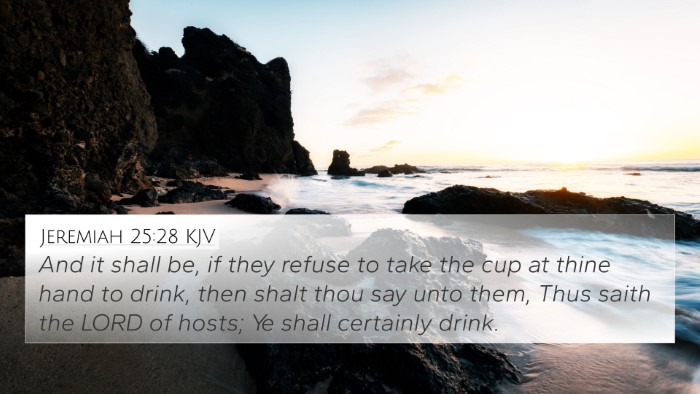Understanding Jeremiah 25:17
Jeremiah 25:17 states: “Then took I the cup at the Lord's hand, and made all the nations to drink, unto whom the Lord had sent me.” This verse encapsulates a prophetic declaration of judgment upon various nations, illustrating God’s sovereignty over all humanity.
Meaning and Interpretation
In analyzing Jeremiah 25:17, we can glean insights from various public domain commentaries:
- Matthew Henry: Henry interprets this verse as a symbolic act where the prophet Jeremiah serves as the Lord's instrument in proclaiming impending judgment. The “cup” refers to the wrath of God that will be poured out upon nations for their disobedience and idolatry.
- Albert Barnes: Barnes emphasizes that this “cup” represents the judgment of God and that Jeremiah’s act signifies that the nations will not be passive recipients of judgment but will actively partake in their consequences. This highlights the need for nations to heed prophetic warnings.
- Adam Clarke: Clarke notes that this verse illustrates God’s command to Jeremiah to deliver a message of impending doom to the nations. It underlines the universal nature of divine judgment and the responsibility of nations to respond to God's call.
Thematic Connections
This verse is rich with themes of judgment, prophecy, and God's authority. It connects to various other scriptures, illustrating the continuity of biblical themes. Below are some cross-references:
- Isaiah 51:17: “Awake, awake! Stand up, O Jerusalem, which hast drunk at the hand of the Lord the cup of his fury.” — This connects to the theme of divine judgment.
- Revelation 14:10: "The same shall drink of the wine of the wrath of God..." — A New Testament confirmation of God's judgment being poured out.
- Ezekiel 23:32-34: "Thus saith the Lord God; Thou shalt drink of thy sister's cup..." — Illustrates judgment upon nations for their transgressions.
- Jeremiah 25:15: “For thus saith the Lord God of Israel unto me; Take the wine cup of this fury at my hand...” — Directly precedes the verse in question, providing context.
- Habakkuk 2:16: "Thou art filled with shame for glory: drink thou also, and let thy foreskin be uncovered..." — Another passage that speaks of drinking the cup of wrath.
- Psalms 75:8: "For in the hand of the Lord there is a cup, and the wine is red..." — Illustrates the metaphor of God's judgment.
- Matthew 26:39: "O my Father, if it be possible, let this cup pass from me..." — Jesus refers to the cup, symbolizing suffering and divine judgment.
Cross-Referencing Biblical Texts
When studying Jeremiah 25:17, it is essential to employ tools for Bible cross-referencing, such as:
- Bible Concordance: A comprehensive listing of verses to locate themes.
- Bible Cross-Reference Guide: A structured method to explore related scriptures.
- Cross-Reference Bible Study: Strategies for engaging with interconnected texts.
- Bible Chain References: Following themes and ideas throughout scripture.
These tools can enhance understanding and reveal the intricate relationships between biblical texts.
The Importance of Inter-Biblical Dialogue
Engaging with Jeremiah 25:17 through inter-Biblical dialogue enables believers to:
- **Connect themes** across both Testaments, strengthening the understanding of God’s character and plans.
- **Identify prophetic fulfillments** found in the New Testament, enriching biblical study.
- **Draw parallels** between the prophetic messages of the Old Testament and the teachings of Jesus and the apostles.
- **Explore detailed cross-references,** such as those between the Prophets and the New Testament letters.
In conclusion, Jeremiah 25:17 serves as a powerful reminder of God's sovereignty and judgment across nations, calling for a deeper understanding through systematic study of scripture and cross-referencing related verses.







